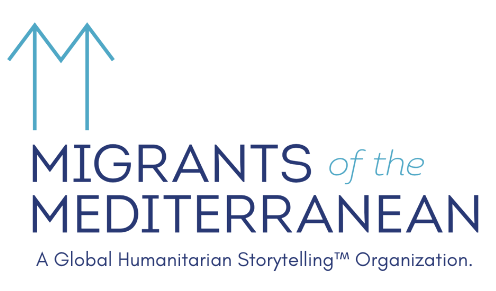MotM Essay | Brave New World
At the CityLife shopping center in the Tre Torri area of Milan, Italy. October 2018. © Pamela Kerpius
16 November 2018
MotM Essay
Brave New World
Part II
There was Baye’s asylum case hearing. There were follow-up interviews from the spring. There were the usual folks to meet in the mountains beyond Bergamo. There was so much to do in Milan.
I was glad to be there, the silkiest city of Italy and the only one I’ve encountered that has an absolute sense of possibility built into its ways and means. There is a flow to the city of Milan where it is practically annunciated across its regal stone facades that this is a proper way to live. Everyone agrees to uphold this flow. Everyone agrees to a quality of life. This is what Milan feels like: civilized.
It is a cliche. Milan is reviled by so many in Italy for having so much and exuding so little emotion, but it seems that is because people here are at peace. What would be the fuss. Milan is a city you inhabit. Milan is a city that serves your sanity, your blood pressure, your pleasure to be at ease.
The plane landing at Linate, Milan’s central airport, from Malta made me feel like I was rushing to a plush, warm bed. Home. I have never experienced such a thrill of sedated domestication. I needed it, as uncool as it was, for the still-weakened state I was in after catching whatever it was that I caught after the sleepless long-haul from New York to the middle of the Mediterranean.
I went off to the grocery store and found The World. You know, The World. Not The World (2004), like in that staggering Jia Zhangke movie, but Milan’s commercial version of it. Go everywhere without going anywhere at all: a British drugstore, a German drugstore, an Italian grocery store, a French cafe inside a British furniture store, a California bakery (I do not know what California and baked goods are famously in common for, but here they are), and then a drone store.
I imagined a wealthy dad delivering his son to select the drone model best suited for the unique state of ennui that would be set in motion inevitably by this shop’s crisp white veneer. It was another Apple Store, basically, reserving the element of utility.
The World, my world, it is “A New World,” the posters across the shopping center told me, and it was the first destination I had found a couple of blocks from my apartment rental in that late afternoon. I found my usual provisions at the popular Italian grocery store chain then hauled them across the white stone complex. It was all for me––my taste, my style, it said in this ceramic expression of diversity. It was all written in English.
The weight from the plastic shoppers pulled across my hands, pooling the blood in my fingertips. The geometry of the open air promenade gave way to a window to the sky that revealed two towers, and one more being built. These were obvious skyscrapers, blatant interruptions in the surrounding open space. The air had the muggy rot you get on aberrant hot days in October; it was about 80 degrees that day.
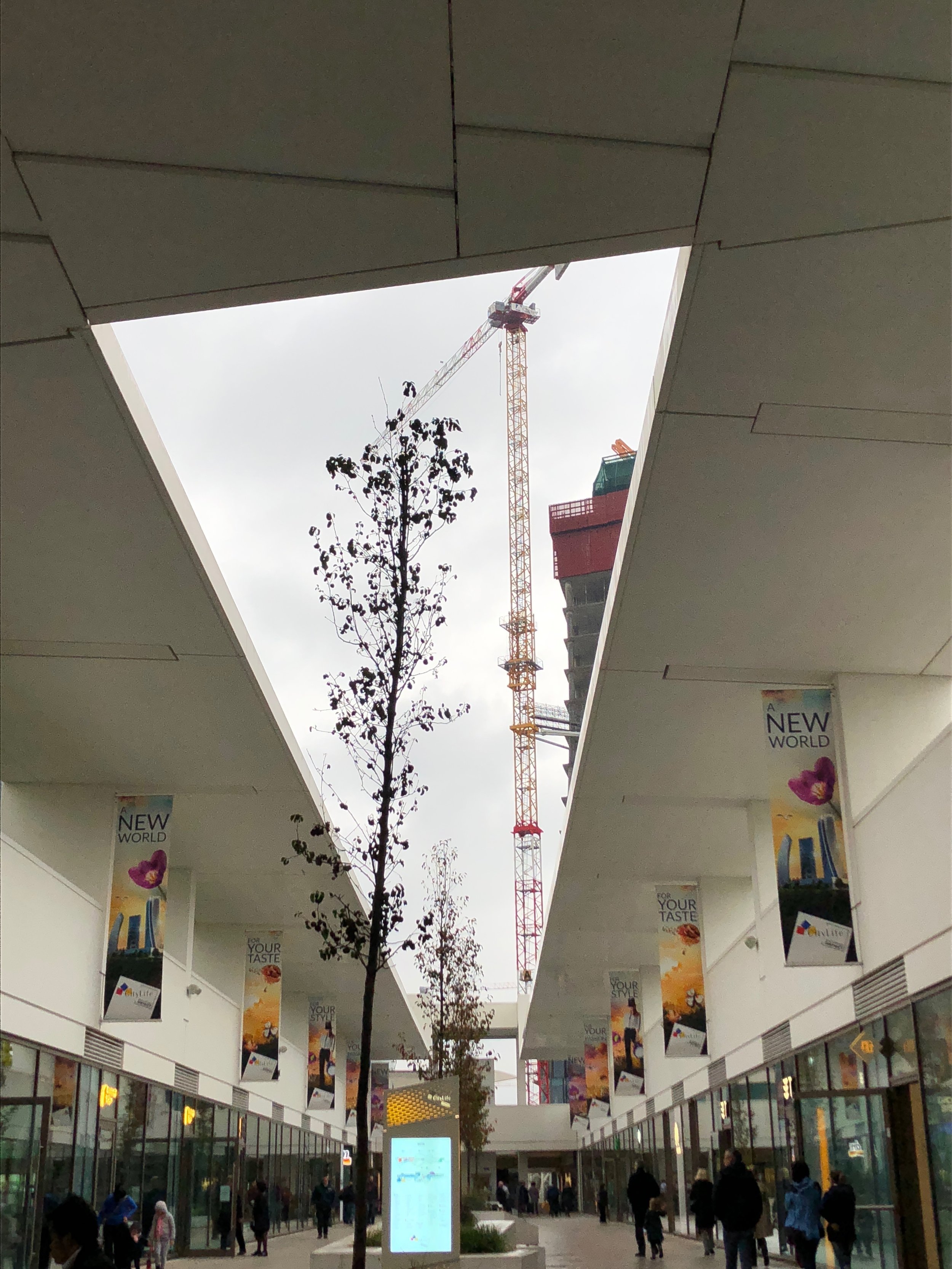
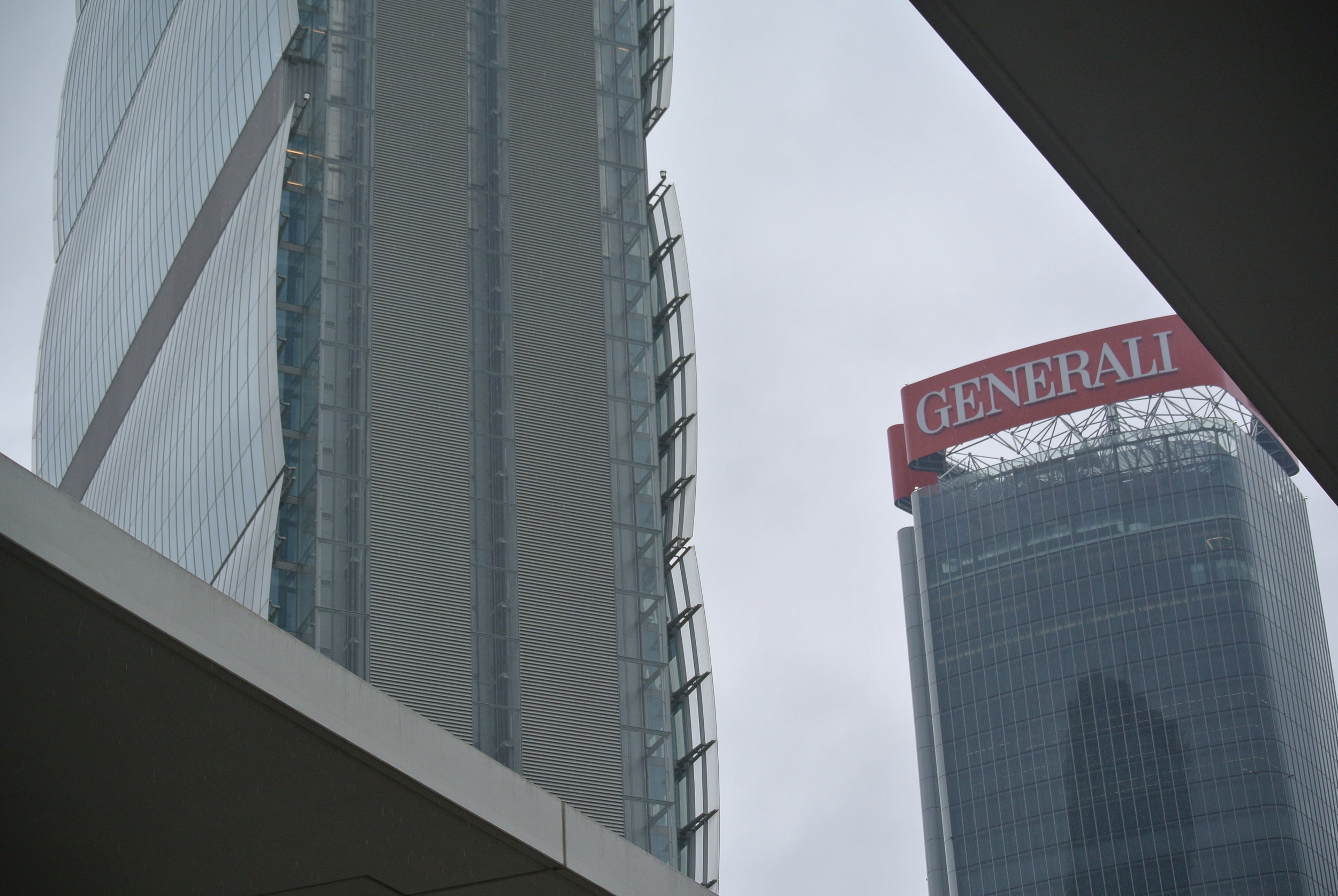
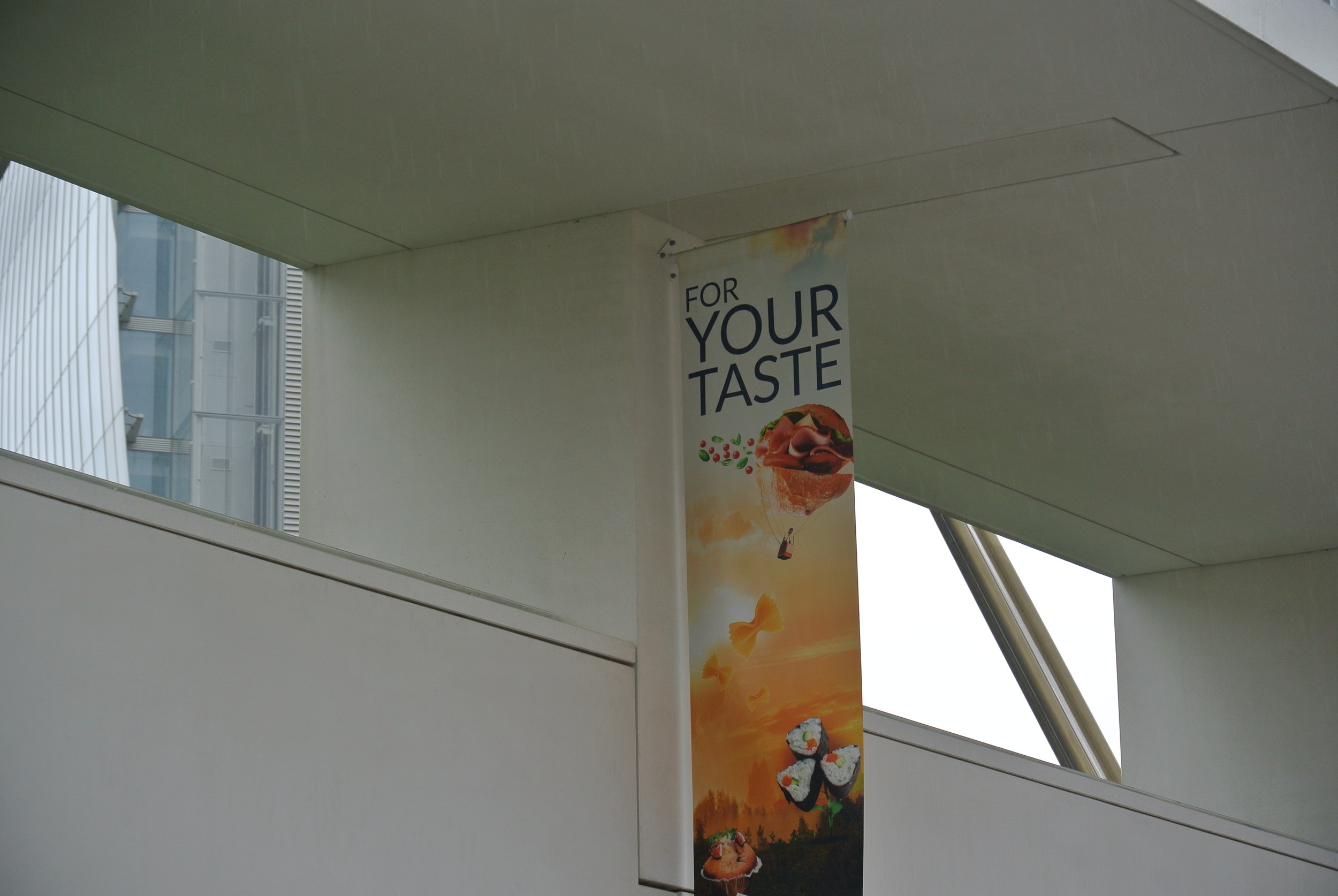
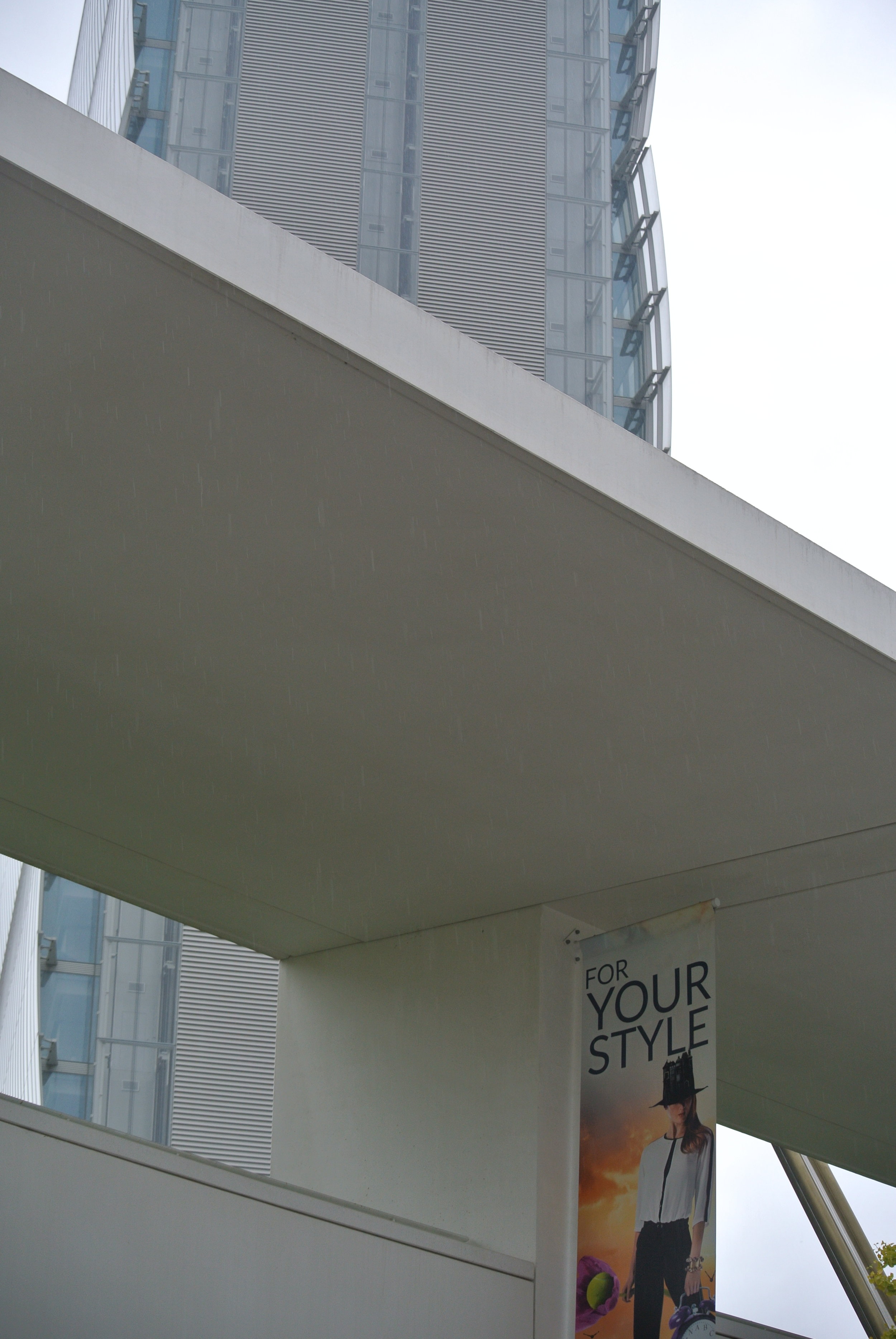
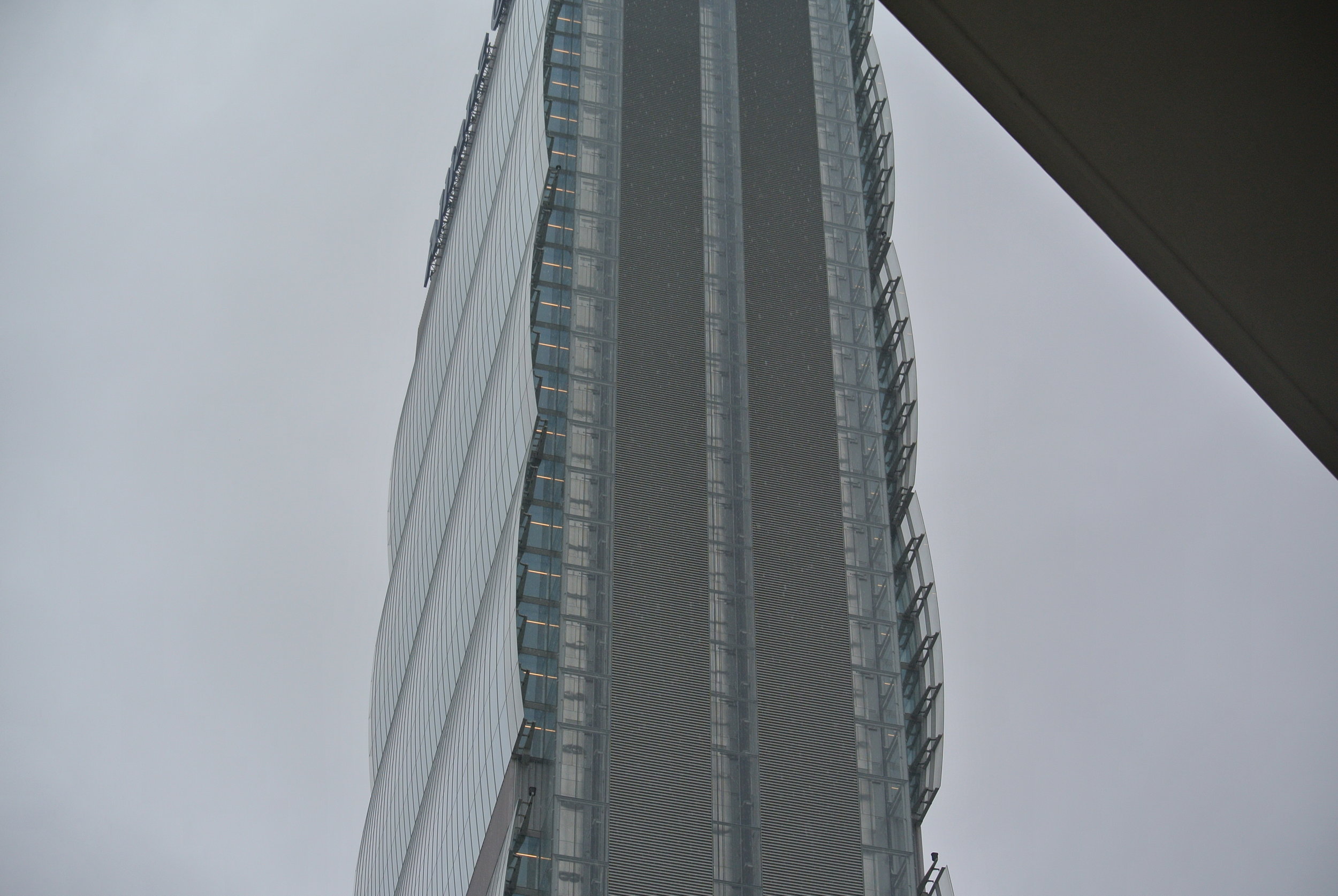
The season seemed lost, but I felt found, situated, totally empowered by the sunlight that would enable easy meetings outdoors.
For the people I met in Lampedusa who live here now, good weather is essential if we are going to meet again. Migrants have no enclosed space to report to, like an office, a restaurant or a museum, for example, and typically congregate in parks and piazzas, or at train stations, where it is easy to cross paths with others like them. But if the weather is bad, WhatsApp will light up with apologetic messages that they must stay in, and you kick your heels at a WiFi cafe pretending to work.
Maybe it was the heat that made me feel like there was so much in front of me, a summer do-over. I unpacked the groceries and my suitcase. I let open the window and the breeze rushed in. Everything felt fresh. My illness seemed like a temporary stroke of exhaustion, and now in a fluke fading away with our imagined autumn.
Do not attach yourself to these metaphors. What a drag it is when I do, then find myself at two o’clock in the morning, standing in the middle of Via Vicenzo Monti, only the RAI radio tower buzzing above me, as I waited for my taxi to take me directly to the pronto soccorso, the emergency room.
My voice was almost completely gone, I could not swallow without a terrible, flinching pain. Breathing was cumbersome. My glands were swollen horribly. The honey-lemon cough drops from the pharmacist in Malta had resigned in their limited abilities, and sleep in this much discomfort proved impossible.
Here is a great way to learn a foreign language.
Stand at the intake desk of an emergency room sobbing, your throat constricting, while the nurse yells at you to, “Tranquilla!”––calm down.
More tears spouting. Alice, drowning in the sea.
“Tranquilla,” she said again.
Calm. Down.
What is the matter.
Mobility actually matters. Because although it was the middle of the night in Milan, making friends at this hour unreachable, it was still early in Canada, six time zones behind me, where a friend, an emigrated Italian who now lives in Toronto was awake and advising me with support. The benefit of human movement and migration continues to reveal itself in measurable ways with so much relief and surprise.
He had sent me a list, at my request, of the Italian terms to describe my symptoms. Don’t think even our best tool of globalization, Google Translate, can do this either, because it regularly eats the syntax, chews the phrasing. It was an immigrant that saved my tail, grazie, thankyouverymuch. At least in theory.
I memorized the words in the taxi so I’d be ready, but somewhere between the car door shutting and “tranquilla” they were gone. No problem. I would pull up the text message as a prompt. But the sobs were coming too hard. I was out of options. I pushed the LED screen in her face:
“They’ll just give you a code white and you’ll wait forever,” my Italian friend in Canada said. Emergency rooms in Italy are color coded by severity of your ailment. Red is serious, yellow not good, green, you’re going to survive.
White is basically tranquilla, so I was glad to receive a green status ticket that lent some credence to my hysteria.
It wasn’t the pain that upset me, it was that I was dealing with this alone. I had to actually tough-talk myself at the apartment that it was time to get real, get out the door and find out what the hell was wrong––to take care of myself. I almost didn’t go. When someone is taking care of you for you, these prompts come easily. Steps are taken. Choices seamlessly made. Words annunciated clearly to the nurse at the intake desk, and you’re on your way to recovery.
Alone, a weight accumulates, and you think that better than try to lift it, maybe just lay under it and hope it goes away. You are too close to your own thoughts that are muddled with self-judgement that perhaps you are being hasty about what is probably just a sore throat. Of all the people sick and ailing in the world and of all that the human body endures so resiliently, is it really necessary to stir yourself to the presence of on-call emergency doctors here in plush Milan?
The acuity of this rationale when you are alone is real.
The doctor flashed the light into my throat and in a second announced it was acute tonsillitis, “È brutta,” she said, “Brutta!” That means bad. Nasty. Girl, you’re sick. My first thought was who gets tonsillitis?
As an American, actually, my first thought was how am I going to pay for this? The cultural contrast that here in Italy I will not have to pay for it never ceases to astonish me. Here, I am taken care of no matter what, and this time, for free. Two years ago in Lampedusa, I contracted a nasty stomach virus that landed me in the island’s emergency room for a tiny fee of fifteen Euros. I assumed it would be a similar or likely higher charge here in Milan, but I was profoundly wrong.
Dear Italy,
Thank you for taking care of me.
Yours,
Pamela
I walked out of the treatment room and back through the waiting room like I had shoplifted something. No one stopped me with the merchandise I had in hand. The strings of gravity had stopped and I floated, lightheaded with self-awareness back into the lobby where the intake nurse greeted me again.
She was a little softer as I shared the diagnosis with her before the debate began among the desk about where to find the nearest 24-hour pharmacy. “Sti cazzi!” she announced with pleasure, when I told her I was headed to The World (Tre Torri, as it is actually called, for the “three towers” that stand guard over that earth), there was one right on the way.
But really, who does get tonsillitis? It’s a kid’s disease. I remember rumors of classmates eating ice cream for days when they had it in elementary school, doctor’s orders. But I never had it. It seemed obvious that this was also a working-through of something in my adolescence that had never been addressed but needed to be to become a bona-fide adult. Take that with a grain of salt, but take it.
Because the remaining time in Milan would be a long meditation about what you could control, what was possible to make happen as one person, what sort of time it would take to do it right, and that you would be required from time-to-time to stop. Sometimes you would be sick, grounded, staring out at the world from your tiny window within it. What emerged was an inkling of the details, the longer order of things.
My rental apartment had books on the art and history of Lombardy on the shelves. I plunked down with one under a cocoon of blankets and tiny Barbie pillows of balled up tissues. There was an image of a jeweled crown that caught my eye and held it there for some time. I didn’t get much further than that page. It became a comforting practice to stare into it understanding the degree of inspiration, planning, and skilled execution that had been required to create it.
It was so small, but no small feat:
Like an eerie response, the rain came the next day and it didn’t stop, leading to some of the worst flooding in the country in a decade. Baye texted that his asylum hearing had actually been moved up; I had missed it anyway. The rain was keeping him indoors now, as well. The slew of people I had met in the piazza last spring were also holed up on account of the rain. The fellas closer to Bergamo took sympathy on my waning voice and agreed we’d see each other the next time.
I forced myself out for a little bit each day anyway. I made it to Milano Centrale railway station hoping to catch a migrant from Sierra Leone who was passing through from Perugia. I met him in Lampedusa 18 months before and we’d been trying in vain to reunite since. His SIM card was spent and there was no WiFi though, so we had no way of finding each other even as we were both in the same place.
I took a walk to the next metro stop away from the station after giving up. It’s a patterned echo of heels on the marble floored corridors that line the boulevard. It’s the section of town I like the least, gray with what I imagine to be not dirt, but a plaque; remains of a city I do not recognize, of a walk through history that everybody wants to forget. It makes me twitch over my shoulder, like that long escape in the unfinished BART tunnels of THX 1138 (1971).
I caught up with exactly zero people I had hoped to profile, or continue to profile on MotM while I was in Milan.
I did reunite with my dearest friend in Italy who (after the antibiotics set in) shared a plate of amazing Eritrean food with me for dinner one night. We talked about how shaky things appeared now, in her country and in mine.
We remembered Lampedusa, where we met two years ago. I told her with resolve that in some sense it didn’t matter the hatred far-right interior minister, Matteo Salvini, had toward migrants, because we saw everything that contradicted it. We were there. We saw what happened in Lampedusa. We heard their voices in those first hours. This could not be taken from us.
The truth was going to be our greatest asset, I said in my strained voice.
It was a spike of optimism I would bring with me when I left Milan the next day. Rome is a world that would want nothing to do with this spirit, but even against its own will, I found out it is brimming with it anyway.
